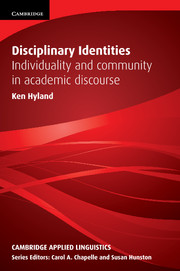Book contents
- Frontmatter
- Contents
- Series editors’ preface
- Preface
- Acknowledgements
- Notes on corpora and abbreviations
- 1 Identity: Interaction and community
- 2 Discipline: Proximity and positioning
- 3 Investigating identity
- 4 Identity in representational genres
- 5 Self-representation in academic bios
- 6 Culture: Authority and visibility
- 7 Reputation: Individuality and conformity
- 8 Gender: Disciplinarity and positioning
- 9 Identity, disciplinarity and methodology
- Appendix: Items with potential metadiscourse functions
- References
- Name Index
- Subject Index
- Frontmatter
- Contents
- Series editors’ preface
- Preface
- Acknowledgements
- Notes on corpora and abbreviations
- 1 Identity: Interaction and community
- 2 Discipline: Proximity and positioning
- 3 Investigating identity
- 4 Identity in representational genres
- 5 Self-representation in academic bios
- 6 Culture: Authority and visibility
- 7 Reputation: Individuality and conformity
- 8 Gender: Disciplinarity and positioning
- 9 Identity, disciplinarity and methodology
- Appendix: Items with potential metadiscourse functions
- References
- Name Index
- Subject Index
Summary
Most applied linguists would agree that an individual’s identity is not ‘fixed’, but is multi-faceted, adapting to and being shaped by particular contexts and types of interaction. In spite of this, little research has attempted to demonstrate how various identities are accomplished through the linguistic choices writers make across a variety of genres. Novice writers are mostly coached to develop their academic selves as though such an identity was a stable target; even critical approaches to academic discourse pit individual identity against a monolithic academic one. In this book, Professor Hyland encourages a more radical engagement with identity. He takes into account status, gender, culture and academic discipline as potential factors in comparing identities, and examines how these interact in a refreshingly wide range of academic discourse types. The book uses, among other genres, student writing, published research articles, book reviews, websites, biographical notes and applications for prizes as data for study. Though he prioritises a corpus-based approach to discourse, Professor Hyland draws on an eclectic mix of methods. He supplements corpus studies, for example, with interviews with individuals whose work is included in the corpus; he draws on perspectives from the study of metadiscourse, systemic functional linguistics and intercultural communication in discussing his results. As with most corpus studies, some of the data come from large, homogeneous groups of writers, but Professor Hyland also focuses on and compares the output of individual writers. He is therefore uniquely placed to consider how facets such as personality and educational background intersect with other concerns such as gender to bring about stylistic variation, and how that variation in turn construes identity.
The book begins with a theoretical approach to ‘discipline’ and ‘identity’, which Professor Hyland examines through the lenses of proximity and positioning. Each subsequent chapter then takes one or more academic text-types and one or more factors affecting identity, using each as an exemplar of how the study of identity might be approached. The final chapter relates the various discussions to pedagogy, considering how the teacher of English for Academic Purposes might negotiate issues of personal and academic identity with students from different backgrounds.
- Type
- Chapter
- Information
- Disciplinary IdentitiesIndividuality and Community in Academic Discourse, pp. vii - viiiPublisher: Cambridge University PressPrint publication year: 2012



